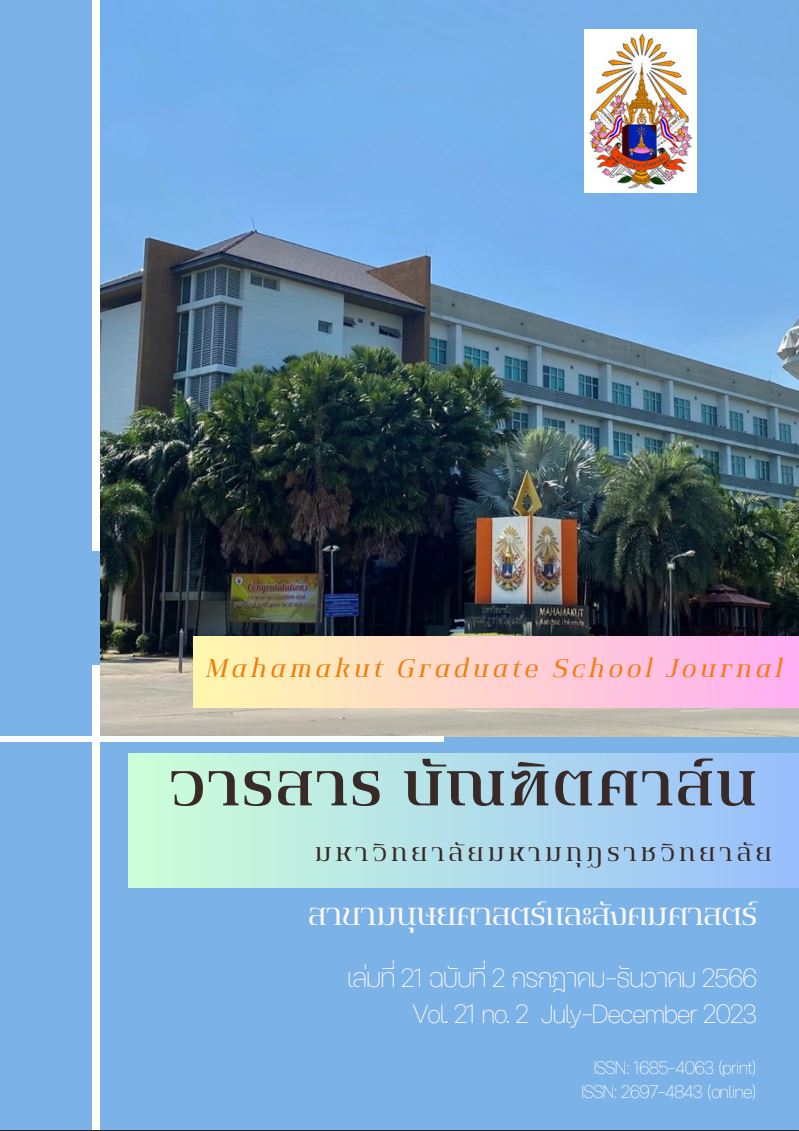การพัฒนาภาวะผู้นำตามหลักกัลยาณมิตรในศตวรรษที่ 21 สำหรับผู้บริหารโรงเรียนมัธยมศึกษา จังหวัดบุรีรัมย์
คำสำคัญ:
การพัฒนา, ภาวะผู้นำ, หลักกัลยาณมิตรบทคัดย่อ
การวิจัยครั้งนี้มีวัตถุประสงค์ 1. เพื่อศึกษาสภาพภาวะผู้นำในศตวรรษที่ 21 ของผู้บริหารโรงเรียนมัธยมศึกษา 2. เพื่อศึกษาหลักการและวิธีการพัฒนาภาวะผู้นำตามหลักกัลยาณมิตร ในศตวรรษที่ 21 สำหรับผู้บริหารโรงเรียนมัธยมศึกษา และ 3. เพื่อเสนอแนวทางการพัฒนาภาวะผู้นำตามหลักกัลยาณมิตรในศตวรรษที่ 21 สำหรับผู้บริหารโรงเรียนมัธยมศึกษา จังหวัดบุรีรัมย์ โดยใช้รูปแบบการวิจัยแบบผสานวิธีระหว่างการวิจัยเชิงปริมาณและเชิงคุณภาพ ใช้กลุ่มตัวอย่างครู จำนวน 191 คน เก็บรวบรวมข้อมูลแบบสอบถามความคิดเห็น ใช้สถิติวิเคราะห์หาค่าเฉลี่ย และค่าเบี่ยงส่วนเบนมาตรฐาน และสัมภาษณ์ผู้ทรงคุณวุฒิ เพื่อนำผลจากการสัมภาษณ์มาสนับสนุนงานวิจัยเชิงปริมาณเกี่ยวกับหลักการและวิธีการพัฒนาภาวะผู้นำของผู้บริหารโรงเรียนมัธยมศึกษาตามหลักกัลยาณมิตรในศตวรรษที่ 21
ผลการวิจัยพบว่า
- ครูมีความคิดเห็นต่อสภาพภาวะผู้นำในศตวรรษที่ 21 โดยภาพรวม อยู่ในระดับมาก ได้แก่ ด้านสมรรถนะ ด้านผลสัมฤทธิ์ ด้านมนุษยสัมพันธ์ ด้านการมีส่วนร่วม และด้านการสื่อสาร ตามลำดับความสำคัญของสภาพภาวะผู้นำในศตวรรษที่ 21 ของผู้บริหารโรงเรียนมัธยมศึกษา จังหวัดบุรีรัมย์
- การศึกษาหลักการและวิธีการพัฒนาภาวะผู้นำตามหลักกัลยาณมิตรในศตวรรษที่ 21 สำหรับผู้บริหารโรงเรียนมัธยมศึกษา จังหวัดบุรีรัมย์ มีดังนี้ 1. ศรัทธาในวิชาชีพ 2. มีศีลธรรม 3. มีการศึกษาดี 4. มีความเสียสละ 5. มีความเพียร 6. มีสติปัญญา และ 7. มีคุณสมบัติกัลยาณมิตรตามหลักสัปปุริสธรรม 7 ได้แก่ รู้เหตุ รู้ผล รู้ตน รู้ประมาณ รู้กาล รู้ชุมชน และรู้บุคคล ในการนำหลักการและวิธีการพัฒนาภาวะผู้นำในศตวรรษที่ 21
- แนวทางการพัฒนาภาวะผู้นำตามหลักกัลยาณมิตรในศตวรรษที่ 21 สำหรับผู้บริหารโรงเรียนมัธยมศึกษา จังหวัดบุรีรัมย์ มีแนวทางการพัฒนา ดังนี้ 3.1 ปิโย (น่ารัก) ผู้นำควรศึกษาพัฒนาบุคลิกภาพ มีมนุษยสัมพันธ์ที่ดี มีจิตใจดีงาม ในเบื้องต้น ของความเป็นภาวะผู้นำให้ดียิ่งขึ้น 3.2 ครุ (น่าเคารพ) ผู้นำควรมีวิสัยทัศน์ จริยวัตรดีงาม วางตนน่าเคารพ มีความหนักแน่น เมื่อเข้าใกล้รู้สึกอบอุ่น และมั่นใจต่อตนเองในความปลอดภัย 3.3 ภาวนีโย (น่ายกย่อง) ผู้นำควรปรับทัศนคติตื่นตัวต่อสถานการณ์การเปลี่ยนแปลงด้านนวัตกรรมและเทคโนโลยีการศึกษาในศตวรรษที่ 21 3.4 วัตตา (รู้จักใช้คำพูด) ผู้นำต้องเข้าใจวิธีการสื่อสารให้ได้ผลให้สอดคล้องกับสถานการณ์และจริตของแต่ละบุคคล มีควากระจ่างสร้างความเข้าใจแก่บุคลากรและทุกคนได้3.5 วจนักขโม (มีความอดทน) ผู้นำต้องอดทน เป็นนักต่อสู้ ไม่ท้อถอย รับฟังปัญหา อุปสรรคต่างๆ ไม่โกรธ ไม่ฉุนเฉียว ไม่หงุดหงิด ด้วยจิตใจมั่นคง เพราะผลเกิดขึ้นจากการฝึกพัฒนาจิตให้เป็นสมาธินั่นเอง 3.6 คัมภีรัญจะ กะถัง กัตตา (ใช้ถ้อยคำลึกซึ้ง) ผู้นำต้องมีศิลปะอธิบายขยายความ ได้ลึกซึ้ง อย่างสุขุม ลุ่มลึก รอบรู้ ให้เข้าใจอย่างเป็นรูปธรรมแก่บุคลากรและทุกคนหายสงสัยได้ 3.7 โน จัฏฐาเน นิโยชะเย (ชักนำไปในทางที่ดี) ผู้นำควรนำหลักการและวิธีการหลีกเลี่ยง ไม่ชี้นำบุคลากรให้เข้าไปเกี่ยวข้องกับสิ่งเสพติดที่ก่อให้เกิดความเสื่อมเสียได้
เอกสารอ้างอิง
กระทรวงศึกษาธิการ, นิยามคำศัพท์หลักสูตร หลักสูตรแกนกลางการศึกษาขั้นพื้นฐานพุทธศักราช 2551,
(กรุงเทพมหานคร: โรงพิมพ์ชุมนุมสหกรณ์การเกษตรแห่งประเทศไทย, 2553), หน้า 13.
จ๊อบส์ดีบี, [COVID-19] ภาวะผู้นำในการขับเคลื่อนองค์กรให้ก้าวต่อไป,[ออนไลน์],
แหล่งที่มา:https://th.jobsdb.com/en-th/cms/employer/covid-19 [12 มิถุนายน 2564].
จอมพงศ์ มงคลวนิช, การบริการองค์การและบุคลากรทางการศึกษา, พิมพ์ครั้งที่ 2, (กรุงเทพมหานคร: พิมพ์ที่
บริษัททวี พริ้นทร์, 2556), หน้า 228.
ทวิชย์ มะระโช (ทวิชย์ มะระโช, “ภาวะผู้นำการเปลี่ยนแปลงของผู้บริหารสถานศึกษา สังกัดสำนักงานเขตพื้นที่การศึกษามัธยมศึกษา เขต 27”, [ออนไลน์], แหล่งทีมา: articlefiles/1499919981.pdf [12
มิถุนายน 2564].
ธานินทร์ ศิลป์จารุ, การวิจัยและการวิเคราะห์ข้อมูลทางสถิติด้วย SPSS และ AMOS, หน้า 75.
ประทุม ฤกษกลาง, หลักการสื่อสารตามแนวพุทธศาสนา, [ออนไลน์], แหล่งที่มา: https://www.bu.ac.th/
knowledgecenter/epaper/julydec2004/pratum.pdf [29 มิถุนายน 2564].
พระราชบัญญัติการศึกษาแห่งชาติ (ฉบับที่ 4) พ.ศ. 2562 ให้ไว้ ณ วันที่ 26 เมษายน พ.ศ. 2562 เป็นปีที่ 4 ในรัชกาลปัจจุบัน, หน้า 49-50.
ทิพาวดี เมฆสวรรค์, การบริหารแบบมุ่งผลสัมฤทธิ์ให้สัมฤทธิ์ผล, [ออนไลน์], แหล่งที่มา: https:// www.tpa.or.th/writer/readthisbook_topic.php?bookID [22 มิถุนายน 2564].
พระพรหมคุณาภรณ์ (ป.อ.ปยุตฺโต), พุทธธรรม ฉบับปรับขยาย, พิมพ์ครั้งที่ 39, (กรุงเทพมหานคร: โรงพิมพ์ มหาจุฬาลงกรณราชวิทยาลัย, 2557), หน้า 537-538.
พรชัย เจดามาน, ภาวะผู้นำยุค 4.0ในพลวัตศตวรรษที่21, [ออนไลน์], แหล่งที่มา: https://
www.kroobannok.com/83149 [28 มิถุนายน 2564].
พระพรหมคุณาภรณ์ (ป.อ.ปยุตฺโต), พจนานุกรมพุทธศาสตร์ ฉบับประมวลธรรม, หน้า 280.)
พระณรงค์ กิตติธโร (เด่น ประเสริฐ), กัลยาณมิตร, [ออนไลน์], แหล่งที่มา: https://www.thaiกัลยาณมิตร
healthlife. [27 มิถุนายน 2564].
พระพรหมคุณาภรณ์ (ป.อ.ปยุตฺโต), พจนานุกรมพุทธศาสตร์ ฉบับประมวลธรรม, หน้า 280.
รัฐธรรมนูญแห่งราชอาณาจักรไทย ตราไว้ ณ วันที่ 6 เมษายน พุทธศักราช 2560 เป็นปีที่ 2 ในรัชกาลปัจจุบัน, หน้า 14.
ลมเปลี่ยนทิศ, มนุษยสัมพันธ์, [ออนไลน์], แหล่งที่มา: site/darunsitpattanarangsan/sara-na-
ru/mnusysamphanth [24 มิถุนายน 2564].
สำนักงานเขตพื้นที่การศึกษามัธยมศึกษาบุรีรัมย์, [ออนไลน์], http://www.ssbr.go.th/websit-rongreiyn [12 มิถุนายน 2564].
สมเด็จพระสังฆราช (เจริญ สุวฑฺฒโน), ธรรมศึกษา, [ออนไลน์], แหล่งที่มา:
http://mahamakuta.inet.co.th/study/study64/mk6412html. [27 มิถุนายน 2564].
R.V. Krejcie และ D.W. Morgan อ้างใน ธานินทร์ ศิลป์จารุ, การวิจัยและการวิเคราะห์ข้อมูล ทาง สถิติด้วย SPSS และ AMOS, พิมพ์ครั้งที่ 17, (กรุงเทพมหานคร: เอส.อาร์.พริ้นติ้ง แมสโปรดักส์, 2560), หน้า 49.
ดาวน์โหลด
เผยแพร่แล้ว
รูปแบบการอ้างอิง
ฉบับ
ประเภทบทความ
สัญญาอนุญาต
ลิขสิทธิ์ (c) 2023 มหาวิทยาลัยมหามกุฏราชวิทยาลัย

อนุญาตภายใต้เงื่อนไข Creative Commons Attribution-NonCommercial-NoDerivatives 4.0 International License.
บทความวิชาการและบทความวิจัยในวารสารฉบับนี้ถือเป็นความรับผิดชอบของผู้เขียนเท่านั้น บทความที่ได้รับการตีพิมพ์ในวารสารบัณฑิตศาส์น ถือเป็นลิขสิทธิ์ของมหาวิทยาลัยมหามกุฏราชวิทยาลัย ตามพระราชบัญญัติลิขสิทธิ์



